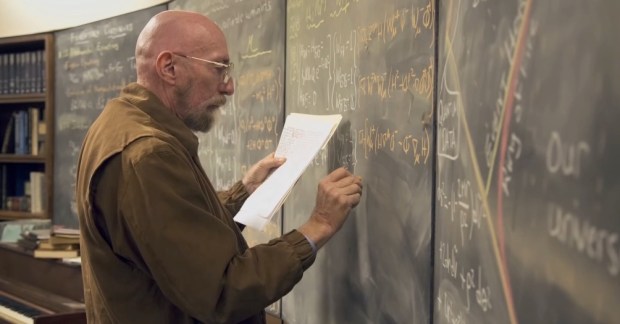
Kip Thorne works at a blackboard in a screenshot taken from a promotional video for Interstellar. Credit: Warner Brothers.
Astronomy enthusiasts are my kinda people. Like me, they love all sorts of science, and science fiction, too — particularly films that lead us into a dystopian, mysterious, explorative future we can’t experience in our everyday lives. One of the most intriguing recent films of this type is the 2014 effort Interstellar, which I am willing to wager there’s a pretty good chance you’ve seen.
Nominated for five Academy Awards, the movie performed extremely well and became an instant favorite for many science nerds. The New York Times declared that Interstellar investigates the relationships between “science and faith and science and the humanities” and that it illustrates the symbiosis between the fields.
The film featured a cast including Matthew McConaughey, Anne Hathaway, Jessica Chastain, Bill Irwin, Ellen Burstyn, Michael Caine, and Matt Damon. Its cowriter, director, and producer was Christopher Nolan, and an executive producer was none other than Kip Thorne, the celebrated Caltech astronomer. Kip also acted as the film’s science consultant and wrote a tie-in book, The Science of Interstellar. He is very well known as the world’s leading expert on black holes, and is celebrated for his long body of astronomical work and collaboration with many important associates, including his good friends Stephen Hawking and Carl Sagan.
In 2017 Kip won the Nobel Prize along with his collaborators Rainer Weiss and Barry Barish for their major contributions to the LIGO gravitational wave detectors and the breakthrough discovery of gravitational waves from colliding black holes. In recent years I’ve had to pleasure to get to know Kip, as he is an active and frequent speaker and collaborator at the Starmus Festival, the science gatherings for which I serve on the board. Without question, he is one of the most brilliant, kind, and straight-out funny people in the entire world of astronomy and astrophysics.
Born in Logan, Utah, Kip studied at Caltech before earning master’s and PhD degrees at Princeton, for the latter studying under the supervision of John Archibald Wheeler. Returning to Caltech in 1967, he soon thereafter became one of the youngest full professors in the history of the institution. He held some adjunct professorships, too, and after a long and storied career, resigned his professorship in 2009, went emeritus, and concentrated on writing and movie projects.
A world-class expert
Aside from being one of the fathers of LIGO, Thorne is an expert on black hole cosmology, hypothetical wormhole and time travel research, relativistic stars, and assorted other astrophysical and cosmological pursuits. He is the author of a number of important books including Gravitation, the classic text coauthored with Charles Misner and John Wheeler, and the celebrated Black Holes and Time Warps.
Kip’s involvement in Interstellar arguably made it one of the most compelling sci-fi films not only of our time, but perhaps of all time. The story begins in 2067, when earthlings are facing a global famine. The plot moves quickly and is both hypothetical and smart enough to keep novices on their edges of their seats and to earn the respect of those who know science. McConaughey’s character discovers a gravitational anomaly inside a bedroom, and the pattern leads to a NASA administrative facility. A NASA team, meanwhile, prepares to travels through a wormhole near Saturn. McConaughey’s character leads a spacecraft crew on this dangerous mission.
Through the wormhole, the crew finds an ocean world complete with tidal waves, and return after experiencing time dilation, 23 years having passed on Earth and a few hours for the crew. They envision an exodus from Earth to find a habitable world. A second planet through the wormhole offers a possible habitat. During a complex set of problems, this doesn’t work out, and they seek a third planet. Countless adventures follow, and allow the writers and filmmakers to explore all manner of dramatic and scientific subjects and possibilities.

Kip Thorne is unique among the world of astronomy. He has long been one of the world’s greatest experts on a panel of very important areas, those at the cutting edges of our curiosity. And yet his brilliant and groundbreaking knowledge has not limited his ability to communicate very smoothly and effectively with novices, and to entertain us all with inspiring stories.
Interstellar is a grand vision of just this mixture. If you have not seen the film, I encourage you to do so. If you have, perhaps you will sometime watch it again, and realize the story hides an advisor who made the script and the direction a little better, and a little more inspiring, toward the scientific wonder we all treasure.
David J. Eicher is Editor of Astronomy, author of 26 books on science and history, and a board member of the Starmus Festival and of Lowell Observatory.

